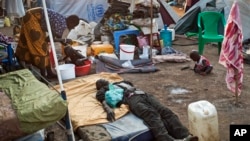Former Nigerian president Olusegun Obasanjo told a U.N. Human Rights Council meeting this week that the nine-month conflict in South Sudan took on distinct ethnic overtones early on.
"The recent problem - the one of the 15th of December - started as a political disagreement in Juba, but quickly degenerated into an ethnic conflict... and it has led, particularly among two major ethnic groups, the Dinka and the Nuer, to a very, very bad situation," Obasanjo said.
Obasanjo, who chairs an African Union Commission of Inquiry that is investigating human rights abuses in South Sudan, was reacting to a speech made by South Sudanese Justice Minister Paulino Waniwilla Unango at a panel discussion hosted by the Geneva-based Rights council
The recent problem - the one of the 15th of December - started as a political disagreement in Juba, but quickly degenerated into an ethnic conflict.Former Nigerian president Olusegun Obasanjo
Unango praised the government of President Salva Kiir for successfully defusing tensions in South Sudan, including by sending members of a committee around the country to spread the message "... that there was no ethnic struggle, based especially among the two major ethnic groups in my country."
"It was a political struggle within the same party, resulting in the armed conflict," Unango said.
The justice minister also asserted that government efforts have led to vastly improved security in Juba, and thousands of internally displaced persons (IDP) who had sought shelter at U.N. compounds have returned to their homes.
No South Sudan leader can claim innocence.Olusegun Obasanjo on rights violations in South Sudan
Unango said a peacebuilding committee set up by the government "has succeeded in Juba in bringing out a lot of people from the IDP centers, from IDP compounds on UNMISS" sites.
"And, also, the government has improved security in Juba by providing more police force," he said.
But Ibrahim Wani, the director of Human Rights for the U.N. Mission in South Sudan (UNMISS), told the panel South Sudan was still rife with "serious human rights problems," including revenge rapes, killings -- some of them ethnically targeted -- and mass displacement. Security was still lacking and people's lives are still severely disrupted, he said.
Juba-based UNMISS spokesman Joseph Contreras disputed the claim that IDPs are leaving U.N. bases around South Sudan and going back home.
"The latest estimate is, I think, around 99,000 staying at various bases of UNMISS nationwide," Contreras said. Data released Thursday by the U.N. show that around 97,000 people are sheltering at U.N. bases in South Sudan; 28,000 of them are at two U.N. compounds in Juba.
"I think it's fair to say that most of the people we have been protecting for the past months are still staying on our premises," Contreras said.
Both sides guilty of rights violations
Mr. Obasanjo did not indicate when the African Union commission he leads will submit its final report, but he said he has "no doubt that there have been gross violations of human rights in South Sudan," and that they have been committed by both sides.
"No South Sudan leader can claim innocence," he said.
The panel discussion was held during the Geneva-based Human Right's Council's 27th session. South Sudan has also been the topic of discussion on many occasions at the U.N. General Assembly session, being held in New York this week.
In speeches to the General Assembly and at high-level meetings, U.N. Secretary General Ban Ki-moon and African presidents have urged the leaders of South Sudan to make peace so that the suffering of hundreds of thousands of people who are displaced, face hunger and are exposed to disease, can be alleviated.
Peace talks, which regional bloc, the Intergovernmental Authority on Development (IGAD), has been hosting since January, have so far been unsuccessful in ending the fighting in South Sudan, which has claimed more than 10,000 lives and displaced around 1.8 million.
President Kiir will address the U.N. General Assembly session in New York on Saturday.





